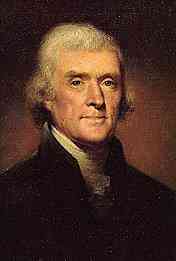To the Earl of Buchan Washington, July 10, 1803
 MY LORD,
MY LORD,-- I received, through the hands of Mr. Lenox, on his return to the United States, the valuable volume you were so good as to send me on the life and writings of Fletcher, of Saltoun. The political principles of that patriot were worthy the purest periods of the British Constitution; they are those which were in vigor at the epoch of the American emigration. Our ancestors brought them here, and they needed little strengthening to make us what we are. But in the weakened condition of English whigism at this day, it requires more firmness to publish and advocate them than it then did to act on them. This merit is peculiarly your Lordship's; and no one honors it more than myself. While I freely admit the right of a nation to change its political principles and constitution at will, and the impropriety of any but its own citizens censuring that change, I expect your Lordship has been disappointed, as I acknowledge I have been, in the issue of the convulsions on the other side the channel. This has certainly lessened the interest which the philanthropist warmly felt in those struggles. Without befriending human liberty, a gigantic force has risen up which seems to threaten the world. But it hangs on the thread of opinion, which may break from one day to another. I feel real anxiety on the conflict to which imperious circumstances seem to call your nation, and bless the Almighty Being, who, in gathering together the waters under the heavens into one place, divided the dry land of your hemisphere from the dry lands of ours, and said, at least be there peace. I hope that peace and amity with all nations will long be the character of our land, and that its prosperity under the Charter will react on the mind of Europe, and profit her by the example. My hope of preserving peace for our country is not founded in the greater principles of non-resistance under every wrong, but in the belief that a just and friendly conduct on our part will procure justice and friendship from others. In the existing contest, each of the combatants will find an interest in our friendship. I cannot say we shall be unconcerned spectators of this combat. We feel for human sufferings, and we wish the good of all. We shall look on, therefore, with the sensations which these dispositions and the events of the war will produce.
I feel a pride in the justice which your Lordship's sentiments render to the character of my illustrious countryman, Washington. The moderation of his desires, and the strength of his judgment, enabled him to calculate correctly, that the road to that glory which never dies is to use power for the support of the laws and liberties of our country, not for their destruction; and his will accordingly survives the wreck of everything now living.
Accept, my lord, the tribute of esteem, from one who renders it
with warmth to the disinterested friend of mankind, and assurances of
my high consideration and respect.
